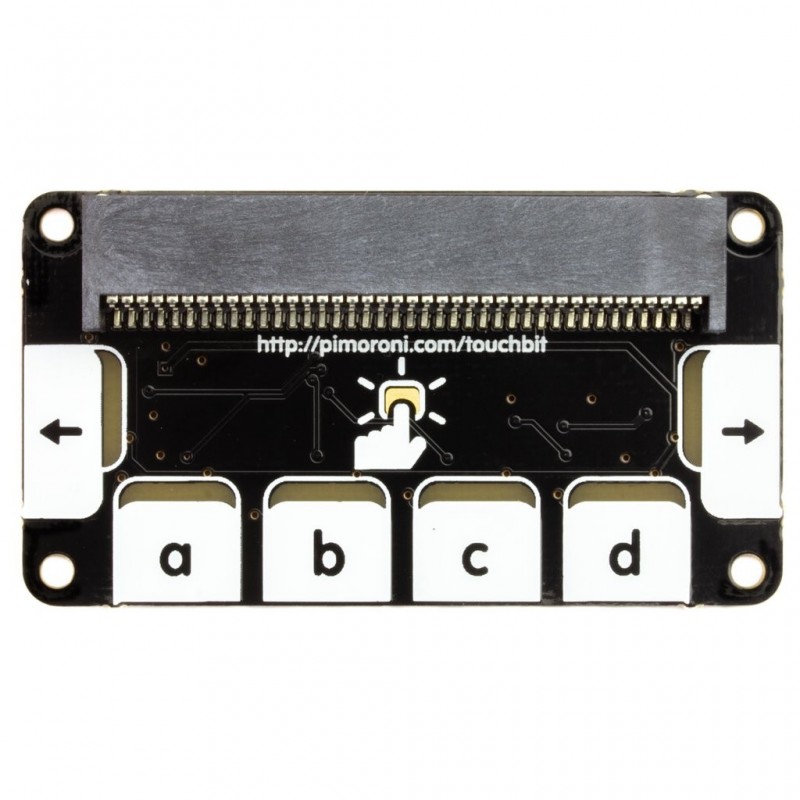

The module with 6 capacitive touch buttons and 6 LEDs, designed to work with micro:bit. The buttons and LEDs are connected by the CAP1166 controller, which communicates via the I2C interface. The board allows you to add an interface for interaction with the user, e.g. when building an audio player or for controlling lighting or a mobile robot. The module can be programmed using the Microsoft MakeCode block editor. Documentation with a library for MakeCode and examples is available in the GitHub repository.
Manufacturer BTC Korporacja sp. z o. o. Lwowska 5 05-120 Legionowo Poland sprzedaz@kamami.pl 22 767 36 20
Responsible person BTC Korporacja sp. z o. o. Lwowska 5 05-120 Legionowo Poland sprzedaz@kamami.pl 22 767 36 20
Educational micro:bit module with 32-bit ARM Cortex-M4 microcontroller. Manufactured to interest the youngest in computer engineering. SparkFun DEV-17287
Starter kit with micro:bit v2. In addition to the micro:bit v2 board, the set includes a microUSB-USB cable, a battery basket and two AAA batteries. SparkFun DEV-17288
Module with 17x7 LED matrix display (119 LEDs) designed to work with micro:bit. It uses the IS31FL3731 driver and communicates via the I2C interface. Pimoroni PIM353
A module with a set of environmental sensors (pressure, temperature and humidity sensor, light sensor, MEMS microphone) designed for micro:bit. Pimoroni PIM355
Educational micro:bit module with 32-bit ARM Cortex-M4 microcontroller. Manufactured to interest the youngest in computer engineering. SparkFun DEV-17287
Starter kit with micro:bit v2. In addition to the micro:bit v2 board, the set includes a microUSB-USB cable, a battery basket and two AAA batteries. SparkFun DEV-17288
Starter kit with micro:bit v2. The set includes the most necessary elements needed to implement micro:bit projects: LEDs, buttons, potentiometer, servo, prototype board and a set of cables. SparkFun KIT-17362
No product available!
The magic:bit expansion module is designed to work with the micro:bit learning board. It can control servos, DC motors, stepper motors, has four RGB LEDs, an IR receiver and a buzzer
The IO expansion module is designed to work with the micro:bit educational board. There are 20 GPIO pins on the board, a buzzer and a voltage stabilization circuit
The IO expansion module is designed to work with the micro:bit educational board. There are 20 IO pins on the board, a buzzer, audio output and voltage stabilization circuit
No product available!
The expansion module is designed to work with the micro:bit educational board. It allows you to build an electronic piano
No product available!
Starter kit for the micro:bit v2. The kit includes an expansion module with Grove connectors, Grove modules with sensors and the necessary accessories. Seeed Studio 110060762
The expansion module is designed for micro:bit v2. It is equipped with connectors to which you can attach modules compatible with the Grove standard. Seeed Studio 103100063
Starter kit for the micro:bit educational module. The kit includes an expansion module with Grove connectors, Grove modules and the necessary accessories. Seeed Studio 114991970
Silicone case designed for the micro:bit educational module. Yellow color. Seeed Studio 114991667
Silicone case designed for the micro:bit educational module. Red color. Seeed Studio 114991661
No product available!
The module with a heart rate sensor and the SpO2 level dedicated to micro:bit. It is based on the MAX30102 chip and communicates via the I2C interface. SparkFun SEN-15271
Soil moisture sensor dedicated to micro:bit. It is supplied with the voltage from 3.3 V to 5 V and communicates via an analog signal. SparkFun SEN-15272
A module with an electret microphone, amplifier and ADC converter dedicated to micro: bit. It communicates via the I2C interface. SparkFun SEN-15289
Data logger dedicated to micro:bit. It connects to the module via the UART interface and allows you to save data on a microSD card. SparkFun DEV-15270

The module with six touch buttons and LED diodes is designed for micro:bit. It uses the CAP1166 driver and communicates via the I2C interface. Pimoroni PIM401
